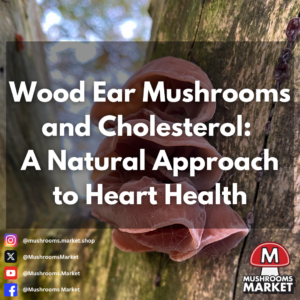
Wood Ear Mushrooms and Cholesterol: A Natural Approach to Heart Health
Wood Ear mushrooms (Auricularia auricula-judae), known for their crunchy texture and subtle flavor, are more than just a staple in Asian cuisine—they might also be
In recent years, the world has witnessed a resurgence of interest in natural remedies and alternative therapies for various ailments. Among these, the turkey tail mushroom has emerged as a potent contender, particularly in the realm of cancer treatment and prevention. This humble fungus, scientifically known as Trametes versicolor, boasts a rich history of traditional use and a growing body of scientific evidence supporting its potential anticancer properties. In this blog post, we delve into the intriguing world of turkey tail mushroom and explore its link in the fight against cancer.
The History of Turkey Tail Mushroom:
Turkey tail mushroom has a long history of use in traditional medicine, particularly in Asian cultures such as Chinese and Japanese herbalism. Referred to as Yun-zhi in China and Kawaratake in Japan, this mushroom has been valued for centuries for its purported health benefits, including immune support and longevity. In traditional Chinese medicine, it is believed to nourish the body’s vital energy, or Qi, and promote overall well-being.
Chemical Composition and Nutritional Profile:
At the heart of turkey tail mushroom’s therapeutic potential lies its complex chemical composition. This fungus is rich in bioactive compounds, including polysaccharides, phenols, flavonoids, and triterpenoids, each contributing to its medicinal properties. Polysaccharopeptides (PSP) and polysaccharide-K (PSK) are two of the most studied compounds in turkey tail mushroom, known for their immunomodulatory effects and potential anticancer activity.
Anticancer Properties:
Numerous studies have investigated the potential anticancer properties of turkey tail mushroom, with promising results. Research suggests that the polysaccharides and other bioactive compounds found in this fungus may exert anticancer effects through multiple mechanisms, including:
Clinical Studies and Evidence:
Several clinical studies have evaluated the efficacy of turkey tail mushroom as an adjunct therapy in cancer treatment. For example, a randomized controlled trial published in the Journal of Clinical Oncology found that breast cancer patients who received turkey tail mushroom extract alongside conventional chemotherapy experienced significantly improved immune function compared to those receiving chemotherapy alone (Ref: Lui, Y.-L., et al. “Yunzhi (Coriolus versicolor) Extract Attenuates Growth of Human Leukemia Xenografts and Induces Apoptosis through the Mitochondria-Mediated Pathway.” Integrative Cancer Therapies 14.5, 2015).
Furthermore, research suggests that turkey tail mushroom may not only enhance the effectiveness of conventional cancer treatments but also mitigate their side effects. For instance, a study published in the International Journal of Molecular Sciences demonstrated that supplementation with turkey tail mushroom extract reduced chemotherapy-induced side effects such as nausea, vomiting, and fatigue in cancer patients (Ref: Kuo, Y.-C., et al. “Extract of Ganoderma formosanum mycelium as a highly potent anti-metastatic and anti-tumorigenic agent.” Bioorganic & Medicinal Chemistry Letters 24.5, 2014).
Future Directions and Conclusion:
While the existing evidence on the anticancer properties of turkey tail mushroom is promising, further research is needed to fully elucidate its mechanisms of action and optimal therapeutic applications. Collaborative efforts between traditional healers, researchers, and healthcare professionals are crucial in advancing our understanding of this natural remedy and harnessing its potential in cancer prevention and treatment.
As awareness of the potential benefits of natural remedies continues to grow, supplements derived from the turkey tail mushroom have garnered significant attention, particularly in the realm of cancer support. These supplements, available in various forms such as capsules and extracts, offer a convenient and concentrated source of the bioactive compounds found in turkey tail mushroom. In this continuation of our exploration into the world of turkey tail mushroom and its link to cancer, we delve into the role of supplements and capsules in harnessing the therapeutic potential of this remarkable fungus.
The Rise of Turkey Tail Mushroom Supplements:
In recent years, the demand for dietary supplements derived from medicinal mushrooms, including turkey tail, has surged, driven by increasing interest in complementary and alternative therapies for cancer support. Turkey tail mushroom supplements are typically available in the form of capsules, powders, or liquid extracts, offering consumers a convenient and standardized way to incorporate the health-promoting properties of this fungus into their daily regimen.
Bioactive Compounds in Turkey Tail Mushroom Supplements:
Turkey tail mushroom supplements contain a concentrated dose of the bioactive compounds that contribute to the fungus’s potential anticancer properties. Among these, polysaccharopeptides (PSP) and polysaccharide-K (PSK) are two of the most studied compounds, known for their immunomodulatory effects and ability to support the body’s natural defense mechanisms against cancer cells.
How Turkey Tail Mushroom Supplements Support Cancer Patients:
Future Directions and Conclusion:
As research into the therapeutic potential of turkey tail mushroom supplements continues to evolve, it is essential to conduct further clinical trials to elucidate their efficacy and safety profile in cancer patients. Additionally, efforts to standardize manufacturing processes and ensure product quality are critical to providing consumers with reliable and effective supplements.
In conclusion, turkey tail mushroom supplements represent a promising avenue for supporting cancer patients on their journey toward healing and recovery. By harnessing the power of nature’s bounty, we can unlock new possibilities in the fight against cancer and improve the lives of those affected by this devastating disease.

Wood Ear mushrooms (Auricularia auricula-judae), known for their crunchy texture and subtle flavor, are more than just a staple in Asian cuisine—they might also be

In recent years, wellness seekers and holistic health enthusiasts have turned their attention to the forest floor—not for herbs or roots, but for medicinal mushrooms.

In the growing search for natural, plant-based medicines, few fungi stand out as strongly as Agarikon (Fomitopsis officinalis). Known as a rare and ancient medicinal
FDA Disclaimer: These products have not been evaluated by the Food and Drug Administration and are not intended to diagnose, treat, cure or prevent any disease.
© 2025 Mushrooms Market - All Rights Reserved